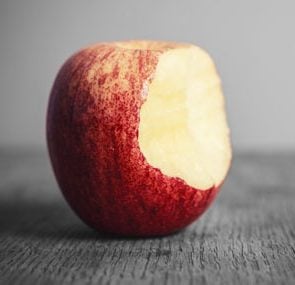An apple a day keeps the doctor away—maybe
There are a lot of health adages passed down through the generations. Some of them have withstood the test of time. (Chicken soup does have some health-promoting properties.)
Others are nothing more than health myths. (Going outside in the cold will not make you catch a cold.)
But one of the most popular sayings—”an apple a day keeps the doctor away”—may be less clear-cut.
In truth, eating one daily isn’t a free pass to skip doctor’s visits, says Niket Sonpal, MD, a gastroenterologist, internist, and faculty member at Touro College of Medicine in New York City.
“Apples have a plethora of health benefits, and those who eat them frequently are less likely to use prescription medication,” he says. However, apples are not a cure-all. “People who eat apples every day can still suffer from cancer, heart disease, and other health problems.”
Here, our experts break down the good, the bad, and—forgive the pun—the core of this age-old saying.
The meaning and origin of the saying
“An apple a day keeps the doctor away” is an aphorism that originated in Wales in 1866 in rhyming format, according to An Apple A Day by Caroline Taggart.
It originally went, ”Eat an apple on going to bed, and you’ll keep the doctor from earning his bread.”
The saying became popular in the United States in its current form sometime between 1913 and 1922.
It became even more common in America during the Prohibition period—an attempt to move people away from alcohol and towards health.
“It was to encourage people to eat their apples instead of drinking them in cider form,” says Aaron Hartman, MD, integrative and functional medicine specialist and assistant clinical professor in the department of family medicine at Virginia Commonwealth University’s School of Medicine in Richmond.
Another benefit to our ancestors came from the actual eating of the apple.
“The texture of an apple can help clean your teeth,” says Dr. Hartman. “One hundred years ago, teeth brushing was not very common, so eating an apple was a way to help remediate cavities and other dental issues.”
The saying has stuck around because it’s short, easy to understand, and nearly everyone enjoys a good apple—even if it’s in a cider or pie.
It helps that apples are also one of the earliest and easiest on-the-go foods.
They’re portable, prepackaged, low in calories, and high in nutrients, which makes them an ideal snack, says Trista Best, RD, an adjunct nutrition professor and consultant with Balance One Supplements.
Health benefits of apples
Like all fresh produce, apples provide a host of health benefits.
Apples specifically are rich in phytochemicals, according to a study published in Nutrition Journal.
These powerful plant compounds include pectin, a type of prebiotic fiber, polyphenols, and antioxidants like quercetin, catechin, phloridzin, and chlorogenic acid.
Thanks to the fruit’s phytonutrients, eating apples is associated with a lower risk of many diseases and improved physical health measures.
Some of the possible health benefits of apples include:
- Improved digestion
- Lower cholesterol and blood pressure
- Weight loss
- Reduced inflammation
- Stronger bones
Apples may also help lower your risk of getting chronic illnesses, including type 2 diabetes, cardiovascular disease, and some types of cancers.
In addition, apples are about 25 percent water, which makes it a hydrating food and eating an apple might be more satisfying and filling than some other fruits.
This might help with weight concerns and overeating, says Best.

Issues with eating an apple every single day
Apples are really good for you, but that doesn’t mean you have to focus on eating an apple every single day instead of other fruits.
It’s not uncommon for people to focus on one healthy habit, like eating a serving of fresh fruit daily, and think that will make up for other bad habits, says Best.
But apples aren’t magic erasers that can undo a day of fast food or snack foods.
“Yes, apples are healthy, but if the rest of your diet is inundated with unhealthy foods, the apple simply won’t do you any good,” she says.
Tummy troubles
It’s not uncommon for people to experience gas, bloating, and gastrointestinal upset after eating fruit, including apples, says Dr. Hartman.
This is especially true for people who already suffer from stomach issues, like irritable bowel syndrome or an overgrowth of yeast, he adds.
Eating an apple every single day could compound these problems.
However, this can happen anytime you ramp up your intake of high-fiber foods, but usually your body adjusts over time.
Wash your apples
While apples don’t contain pesticides naturally, they are prone to quite a number of diseases and, thus, are often heavily sprayed with chemicals and pesticides that are not easily washed off, says Dr. Hartman.
Apples are on the list of fruits and vegetables most likely to contain pesticide residues, so make sure to thoroughly wash them or buy organic.
The seeds also contain a small amount of amygdalin, a known toxin. While the amount is pretty minuscule, you should probably avoid swallowing the seeds.
Eat apples in moderation, and you won’t ingest too many toxins. But eating a daily apple could expose you to a greater amount.
Make sure not to reduce variety in your diet
The problem with having a “one and done” approach to eating produce is that if you only eat apples, then you’re missing out on all the wonderful health benefits of other fruits, says Dr. Hartman.
Oranges, for example, have a chemical not found in apples called naringin, which has anti-cancer properties. If you’re eating a fruit a day, it’s better to mix it up.
“An apple is a good mix in your healthy diet of fruits and vegetables,” he says. “The key is variety. And just remember that excess of any one good thing can quickly turn that good thing into a bad thing.”
Don’t skip regular checkups
The other half of the adage—keeps the doctor away—is also problematic because it oversimplifies what doctors and health care do, says Dr. Sonpal.
“It is important to remember that regular doctor’s visits are extremely important for health protection and illness prevention,” he says. “Just because you’re not sick doesn’t mean you’re healthy.”
They may cause itchy lips
The most common food allergy is called oral allergy syndrome. That’s when thin-skinned fruits like apples, nectarines, and peaches, as well as some vegetables and tree nuts, can cause your mouth and lips to itch, tingle, and swell.
This happens in up to 5 percent of the population and is caused by seasonal allergies, usually to birch, ragweed, and grass pollen.
While pollen is the true allergen, the immune system mistakenly recognizes some of the proteins in fruit and veggies as foreign invaders too.
If you don’t want to completely avoid certain foods, allergy injections or cooking the fruit might help—but see an allergist to confirm that this is the true cause of your symptoms.
How to get the most out of your apples
Not all methods of ingesting apples are equally good for your health, says Best. The closer you can keep it to the whole fruit, the healthier it is.
Apple pie and fritters are better as occasional treats. A whole, baked apple—like you’ll find in healthy baked apple recipe—is a good choice, as is no-sugar-added applesauce. But the healthiest option is a whole, fresh, raw apple.
There are some other things you can do to make your daily apple healthy:
Don’t peel it
The peel is the most nutrient-dense part of the apple. By discarding it, you lose a lot of the health properties. The same goes for other fruits and veggies you should never peel.
Add a healthy fat
Adding a healthy fat, like a nut butter, to your apple slices will help slow down digestion, aid in nutrient absorption, and help you feel more satiated.
Choose local, in-season fruit
One of the major findings of the Nutrition Journal study was that the nutrient content in apples can vary widely between different varieties, how ripe they are, how long they’ve been stored, the way they were stored or preserved, if they contain any additives, or if they were processed. For maximum health benefits, choose apples that are organic, in season, and grown locally.
What the saying really means
“An apple a day keeps the doctor away” is, at its core, about eating a healthy diet to improve your overall health and therefore reduce your need for extra doctor visits, says Dr. Sonpal.
Taken that way, it’s excellent advice.
Eating apples, even an apple a day, can be part of a healthy diet as long as you’re smart about it.
“As with pretty much anything in life, the key to enjoying the health benefits of apples is all about moderation,” says Dr. Hartman.
The post Does an Apple a Day Really Keep the Doctor Away? appeared first on The Healthy.








